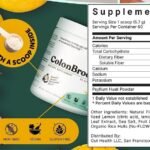Docosahexaenoic corrosive (DHA) is an omega-3 fatty acid that has a place with the gathering of long-chain polyunsaturated fatty acids (LC-PUFAs). It is an essential nutrient, meaning that the body requires it for normal functioning but cannot produce it in sufficient amounts. Therefore, one must obtain it through the diet or dietary supplements.
DHA is a critical structural component of cell layers, especially in the mind and eyes. It assumes an essential part in keeping up with the trustworthiness and smoothness of cell layers, which is significant for ideal cell correspondence and capability. Tissues with high metabolic activity, such as the brain, retina, and sperm cells, highly accumulate DHA.
Marine sources, such as fatty fish (e.g., salmon, mackerel, sardines, and tuna), shellfish, and algae, primarily contain DHA. Fish acquire DHA by consuming green growth or more modest marine living beings that produce it. DHA can likewise be acquired through dietary enhancements, including fish oil cases or green growth based supplements.
Benefits of Docosahexaenoic Acid (DHA)
Docosahexaenoic acid (DHA) offers several health benefits because of its significant role as an omega-3 fatty acid. Here are some potential health benefits related with DHA:
- Brain Health and Cognitive Function: DHA is a fundamental supplement for ideal mental health and capability. It is a significant primary part of synapse layers and is especially bountiful in the dark matter of the mind. Satisfactory admission of DHA upholds mental capability, memory, learning, and in general cerebrum wellbeing. DHA has been related with a decreased gamble of mental deterioration, Alzheimer’s infection, and other neurodegenerative issues.
- Cardiovascular Health: DHA, alongside eicosapentaenoic acid (EPA), adds to cardiovascular health. It helps lower fatty oil levels, decrease aggravation, further develop vein capability, and backing generally heart wellbeing. DHA supplementation has been related with a diminished gamble of coronary illness, including coronary conduit sickness and arrhythmias.
- Inflammation Reduction: DHA has anti-inflammatory properties, like other omega-3 fatty acids. It can assist with decreasing aggravation in the body by adjusting the development of provocative particles, like cytokines and prostaglandins. This anti-inflammatory impact might be gainful in overseeing persistent provocative circumstances, like rheumatoid joint pain, fiery bowel illness, and asthma.
- Eye Health: DHA is exceptionally moved in the retina of the eye, where it assumes an essential part in visual turn of events and capability. Sufficient DHA consumption upholds healthy retinal cells, visual sharpness, and may help safeguard against age-related macular degeneration (AMD), waterfalls, and other eye issues.
- Pregnancy and Infant Development: DHA is especially important during pregnancy and breastfeeding. Satisfactory maternal DHA consumption supports solid fetal turn of events, particularly brain and eye improvement. It has been related with a decreased risk of preterm birth, worked on mental capability in youngsters, and improved visual keenness.
- Mental Health: DHA assumes a part in mental health and has been connected to further developed temperament and diminished side effects of sorrow and tension. It might also emphatically affect conditions, for example, bipolar confusion and attention deficit hyperactivity disorder (ADHD).
Side Effects of Docosahexaenoic acid (DHA)
Docosahexaenoic corrosive (DHA) is by and large viewed as safe for most people when consumed in proper sums. However, similar to any dietary enhancement or drug, DHA might possibly cause aftereffects in certain people. The following are a couple of potential secondary effects related with DHA:
- Gastrointestinal Issues: Certain individuals might encounter gastrointestinal side effects like the diarrhea, sickness, or heartburn while taking DHA supplements. These impacts are typically gentle and can frequently be limited by taking the enhancement with feasts or decreasing the dosage.
- Blood Thinning: DHA has a gentle blood-thinning impact, like other omega-3 fatty acids. While this is for the most part helpful for cardiovascular health, it might expand the risk of draining or bleeding in people who are taking blood-thinning drugs like warfarin or anti-inflamatory medicine like aspirin. Assuming you are on such meds, it’s vital to talk with your healthcare provider prior to beginning DHA supplements.
- Fishy Aftertaste or Burps: Like EPA supplements, DHA supplements, especially fish oil cases, may cause an off-putting persistent flavor or burps. This is ordinarily because of the oxidation of the omega-3 fatty acids in the enhancement. Picking top caliber, sanitized supplements or consuming fresh sources of DHA, like fatty fish, can assist with reduce this side effect.
- Allergic Reactions: Although rare, a people might have a hypersensitive response to DHA or fish oil supplements. Side effects might incorporate tingling, rash, hives, enlarging, or trouble relaxing. Assuming that you experience any indications of a hypersensitive response, look for sure fire clinical consideration.
Dosage Docosahexaenoic acid (DHA)
The proper dosage of docosahexaenoic corrosive (DHA) can change contingent upon elements, for example, age, health status, explicit medical issue, and individual necessities. It is for the most part prescribed to get DHA through dietary sources, like fatty fish, whenever the situation allows. Be that as it may, assuming you’re thinking about DHA supplementation, it’s essential to talk with a healthcare professional or an enrolled dietitian for customized guidance. They can give explicit proposals in light of your special conditions.
Here are some basic guidelines for DHA dosage:
- For general health and maintenance: A normal range for DHA supplementation is around 250-500 milligrams (mg) each day. A good omega-3 supplement often combines this with eicosapentaenoic acid (EPA).
- Cognitive health and age-related cognitive decline: Higher dosages of DHA, going from 500-1000 mg each day, might be suggested for people looking for mental advantages or those encountering age-related mental degradation. In any case, individual necessities can change, and it’s ideal to talk with a medical professional for customized counsel.
- Pregnancy and breastfeeding: DHA is especially significant during pregnancy and breastfeeding for the solid improvement of the hatchling and baby. Pregnant and lactating ladies might profit from higher DHA admission. Explicit proposals might shift, however an ordinary reach for pregnant and lactating ladies is around 200-300 mg of DHA each day, notwithstanding the suggested admission of EPA and different nutrients.
- Cardiovascular health: DHA, alongside EPA, adds to cardiovascular wellbeing. Higher portions of omega-3 fatty acids, including DHA, going from 1 to 4 grams (1000-4000 mg) each day. Healthcare professionals might suggest it for individuals with elevated triglyceride levels or those at high risk of cardiovascular disease. However, individuals should take these higher dosages under clinical supervision.
Combining the dose of DHA with the dosage of EPA in omega-3 supplements is quite important. The proportion of DHA to EPA can shift contingent upon explicit health objectives and recommendations.
Conclusion
Keep in mind, individual necessities can vary, so it’s vital to talk with a medical professional or an registered dietitian who can assess your particular conditions and give customized direction in regards to the suitable dose of DHA for you. DHA and omega-3 intake varies based on age, health, and specific conditions.
It’s essential to take note of that DHA and EPA frequently cooperate synergistically to give medical advantages. Hence, experts recommend achieving an equilibrium of both DHA and EPA for optimal health outcomes.
As usual, it’s fitting to consult with your physician or an enrolled dietitian for customized counsel on DHA consumption, particularly during pregnancy or on the other hand on the off chance that you have explicit wellbeing concerns.







